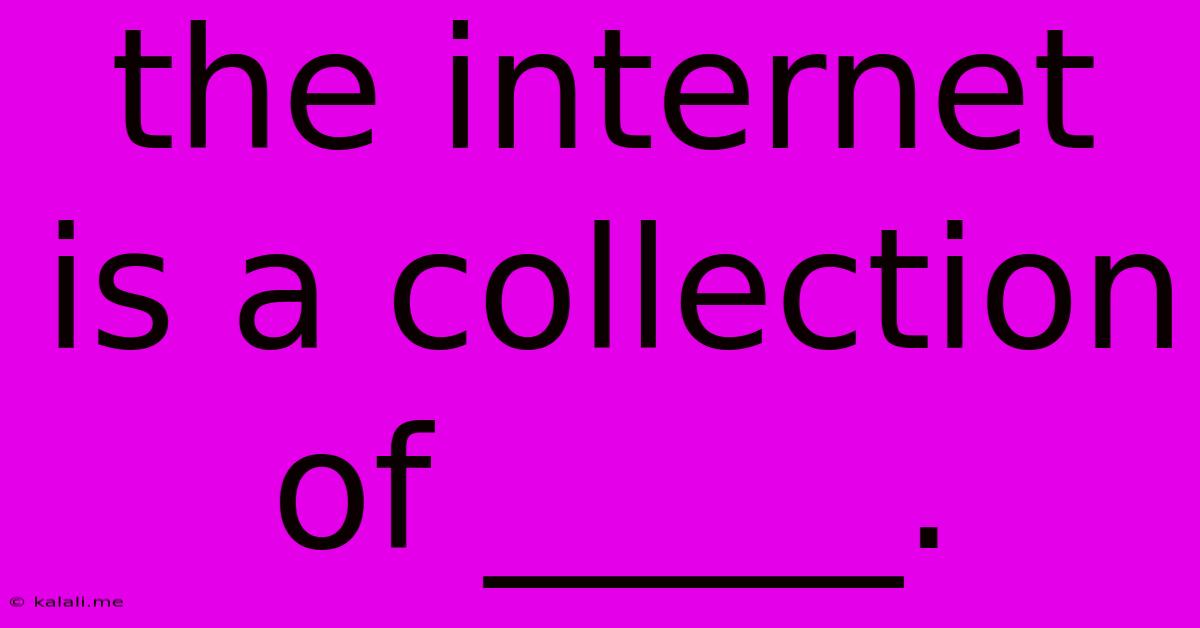The Internet Is A Collection Of _____.
Kalali
Jun 14, 2025 · 3 min read

Table of Contents
The Internet is a Collection of Networks
The internet, a ubiquitous force shaping modern life, is often misunderstood. While many think of it as a single entity, the truth is far more intricate. The internet isn't a single thing; it's a vast, interconnected collection of networks. This seemingly simple statement holds the key to understanding its complexity and power. This article will delve into what constitutes this network of networks, exploring its architecture and the technologies that make it function.
Understanding the "Network of Networks"
The phrase "network of networks" is crucial. It highlights the decentralized nature of the internet. Unlike a centralized system with a single point of control, the internet is a distributed system composed of countless individual networks, each owned and operated by different entities. These networks include:
- Local Area Networks (LANs): These are smaller networks, often within a single building or organization, such as a home network, office network, or school network. They connect devices like computers, printers, and smartphones.
- Metropolitan Area Networks (MANs): Covering a larger geographical area than LANs, MANs connect multiple LANs within a city or region.
- Wide Area Networks (WANs): WANs are the largest type of network, spanning across vast distances, connecting cities, countries, and continents. The internet itself is essentially a massive WAN.
- Global Network Providers (GNPs): These are the backbone of the internet, providing high-speed connections between various networks and countries, facilitating the global exchange of data.
These networks communicate with each other using standardized protocols, allowing for seamless data transfer regardless of the underlying infrastructure. This interoperability is a cornerstone of the internet's success.
The Role of Protocols and Standards
The internet's functionality relies heavily on standardized protocols. TCP/IP (Transmission Control Protocol/Internet Protocol) is the foundational protocol suite that governs how data is transmitted across networks. This suite ensures that data packets are reliably sent, received, and reassembled at the destination. Other crucial protocols include:
- HTTP (Hypertext Transfer Protocol): Enables communication between web browsers and web servers, facilitating the transfer of web pages and other data.
- HTTPS (Hypertext Transfer Protocol Secure): A secure version of HTTP that uses encryption to protect data transmitted between browsers and servers.
- DNS (Domain Name System): Translates human-readable domain names (like google.com) into machine-readable IP addresses, making it easier for users to access websites.
- FTP (File Transfer Protocol): Allows for the transfer of files between computers.
- SMTP (Simple Mail Transfer Protocol): Used for sending email messages.
The Ever-Expanding Internet
The internet is constantly evolving and expanding. New technologies and innovations continuously improve its speed, reliability, and capacity. The rise of mobile internet, cloud computing, and the Internet of Things (IoT) all contribute to its ever-growing complexity and reach. Understanding the internet as a collection of interconnected networks provides a crucial framework for comprehending its dynamic and multifaceted nature. It's not a single, monolithic entity, but a powerful, collaborative system built on shared standards and countless individual networks working together. This decentralized architecture ensures its resilience and adaptability in the face of change.
Latest Posts
Latest Posts
-
Indiana University Of Pennsylvania Gpa Requirements
Jun 14, 2025
-
Second Most Abundant Element In Earth Crust
Jun 14, 2025
-
Which Of The Following Is A Unit Of Energy
Jun 14, 2025
-
The Cpu Consists Of Which Two Parts
Jun 14, 2025
-
What Seismic Waves Are The Most Destructive
Jun 14, 2025
Related Post
Thank you for visiting our website which covers about The Internet Is A Collection Of _____. . We hope the information provided has been useful to you. Feel free to contact us if you have any questions or need further assistance. See you next time and don't miss to bookmark.